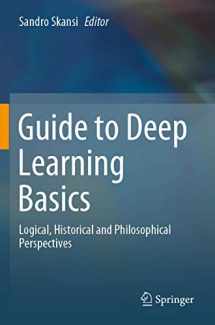
Guide to Deep Learning Basics: Logical, Historical and Philosophical Perspectives
Book details
Summary
Description
This stimulating text/reference presents a philosophical exploration of the conceptual foundations of deep learning, presenting enlightening perspectives that encompass such diverse disciplines as computer science, mathematics, logic, psychology, and cognitive science. The text also highlights select topics from the fascinating history of this exciting field, including the pioneering work of Rudolf Carnap, Warren McCulloch, Walter Pitts, Bulcsú László, and Geoffrey Hinton.
Topics and features:
- Provides a brief history of mathematical logic, and discusses the critical role of philosophy, psychology, and neuroscience in the history of AI
- Presents a philosophical case for the use of fuzzy logic approaches in AI
- Investigates the similarities and differences between the Word2vec word embedding algorithm, and the ideas of Wittgenstein and Firth on linguistics
- Examines how developments in machine learning provide insights into the philosophical challenge of justifying inductive inferences
- Debates, with reference to philosophical anthropology, whether an advanced general artificial intelligence might be considered as a living being
- Investigates the issue of computational complexity through deep-learning strategies for understanding AI-complete problems and developing strong AI
- Explores philosophical questions at the intersection of AI and transhumanism
This inspirational volume will rekindle a passion for deep learning in those already experienced in coding and studying this discipline, and provide a philosophical big-picture perspective for those new to the field.


We would LOVE it if you could help us and other readers by reviewing the book
Book review



